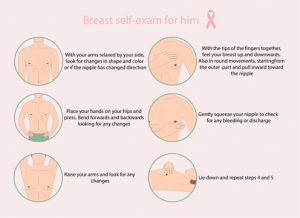WORDS LIM TECK CHOON
 FEATURED EXPERT FEATURED EXPERTDR NIK MUHD ASLAN ABDULLAH Clinical Oncologist Sunway Medical Centre |
BREAST CANCER AFFECTS MEN AS WELL AS WOMEN
Breast cancer in both men and women share many similar attributes.
The most common kinds of breast cancer in men are the same kinds that are present in women, namely:
- Invasive ductal carcinoma
- Invasive lobular carcinoma
- Ductal carcinoma in situ (or DCIS)
Dr Nik Muhd Aslan Abdullah says that breast cancer is, however, rare among men.
WARNING SIGNS
According to Dr Nik, many of the most pressing early warning signs of breast cancer in men are also similar to those found in women, such as:
- Lumps in the breast tissue
- Skin dimpling or puckering
- Nipple retraction
- Unusual discharge from the nipple
HORMONAL CHANGES CAN GIVE RISE TO BREAST CANCER
One reason why breast cancer is rare among men is that the hormone testosterone inhibit the growth of breast tissue, while oestrogen stimulates breast tissue growth.
While men and women have both hormones in their bodies, men have higher levels of testosterone compared to women. On the other hand, women have higher levels of oestrogen.
| Some breast cancer cells have special structures at the surface, called hormone receptors. These cells are called hormone-receptor positive (HR positive for short). Oestrogen can bind to these receptors to cause the growth of these cells. Dr Nik explains that men have a higher possibility of developing breast cancer cells that are HR-positive, when compared to their female counterparts. |
“Breast cancer cells in men are sensitive to hormonal imbalances,” Dr Nik explains, “so any factors or conditions that can lead to an excess of oestrogen and a lack of testosterone will increase their risk of developing breast cancer.”
What can cause the raise in oestrogen levels in men?
- Klinefelter syndrome, a rare genetic condition in which a male has an extra X chromosome and produces lower levels of androgens
- Injury to the testicles
- Use of androgen inhibitors
- Liver cirrhosis (scarring of the liver)
- Obesity
Family history also plays a factor
About 1 out of 5 men with breast cancer is found to have had a family history of the disease.
This is because men can also inherit a mutation in the BRCA1 or BRCA2 genes or in other genes, such as CHEK2 and PALB2. These mutations will highly increase their risk for breast cancer.
“Unfortunately, we do not have a say in the types of genes we inherit,” Dr Nik says.
He recommends that men with a family history of cancer should consider seeking counsel from their doctors about going for genetic screening tests as soon as they can, especially those over the age of 50.
Genetic screening tests involves taking a blood sample for analysis. A genetic counsellor will then advise the person, based on the results given, on what the next best steps would be for him.

MEN WITH HR-POSITIVE BREAST CANCER ARE MORE LIKELY TO RESPOND TO HORMONE TREATMENTS
Dr Nik explains that hormone therapy can be used to help lower the risk of the cancer cells spreading or treat cancer that has come back after treatment.
Why then do men with breast cancer have lower survival rate compared to their female counterpart?
“Through many of the studies that I’ve seen, men who are diagnosed with breast cancer have a 8-9% lower survival rate than women,” Dr Nik says.
He attributes this to the fact that men with breast cancer are often diagnosed late.
“Men will sometimes wait too long to seek out a diagnosis for the symptoms they may be experiencing,” he explains, “or not recognize the warning signs of breast cancer in their bodies.”
As a result, they delay seeking help, and tend to do so only when the cancer has become advanced and spread to other parts of the body.
Dr Nik encourages men to seek a doctor’s opinion if they find themselves experiencing any of the mentioned symptoms related to breast cancer. “Breast cancer can be cured, and it is very treatable if detected early on,” he says.

